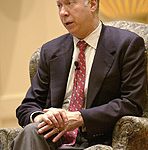The former presidential adviser gave his perspective during a question-and-answer session Tuesday with students, faculty, staff and the community. Details...
 The war with Iraq, and what lies ahead, dominated the discussion in Whitley Auditorium.
The war with Iraq, and what lies ahead, dominated the discussion in Whitley Auditorium.
“We’ve nearly won the war, and the question is can we win the peace?” Gergen said. The Middle East, he added, is “always full of surprises.”
“Our troops have done extraordinarily well,” he said. “It has been an extraordinary success and is about to conclude.”
When asked about plans for post-war Iraq, Gergen said some in the Bush administration want the military to maintain control to safeguard American troops while others support giving the United Nations a central role to ensure the support of Arab nations. In Afghanistan, Kosovo and Bosnia, Gergen noted, the UN handled the transition. The U.S. did a poor job at the end of World War I and improved its performance following WWII.
“The issue now is can we do as well as the end of World War II? We’re much better at war, technology and power. Political management is hard.”
The next major issue for the Bush administration is whether to push for regime changes in Iran and Syria because of their support of terrorism, Gergen said. “Does it stop here or does it go on? That debate is around the corner.”
Gergen was also asked about the quality of intelligence gathered by the U.S. and about reports that Iraqi leader Saddam Hussein was behind the assassination attempt of former President George Bush Sr. Gergen said with the CIA, “It’s a matter of life or death. The CIA has often been right and we don’t hear about it.” He said the U.S. will never know for certain whether Hussein was behind the Bush assassination attempt. “I think we have very solid evidence that he was.”
“We are much better at the technical side of intelligence than we are the human side,” he said. “It is much harder “to read human psychology on the ground.”
Yet Gergen cautioned against exaggerating the dangers in the world. “We exaggerate the threats of people we don’t know really well,” he said. “We exaggerated the Soviet threat and the threat in Vietnam. Let’s not exaggerate the dangers we face in the Middle East.”
Gergen said it’s up to this generation to properly handle these challenges and stem the tide of anti-American feeling in the world.
“Do we understand the rest of the world the way we should or do we only understand the American perspective?” he said. “We need to understand what the rest of the world is thinking.” He encouraged students to travel often and learn other cultures.
After the question-and-answer session, Gergen was scheduled to appear alongside former CBS News anchor Walter Cronkite for “A Conversation with Walter Cronkite” in Alumni Gym.
This is Gergen’s second visit to Elon. In January 2001, he participated in a panel discussion on the presidency as part of Elon’s Winter Term program.
Gergen appears regularly as an analyst on ABC’s “Nightline” and is editor-at-large of U.S. News & World Report. He is a professor of public service at the John F. Kennedy School of Government and co-directs is Center for Public Leadership. He is the author of Eyewitness to Power: The Essence of Leadership, Nixon to Clinton.


